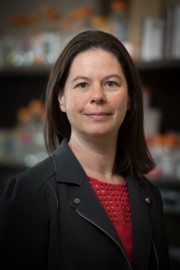Hurvitz Brain Sciences Program
SRI programs

Senior scientist
Sunnybrook Health Sciences Centre
2075 Bayview Ave., Room S1 12
Toronto, ON
M4N 3M5
Administrative Assistant: Josephine Ha
Phone: 416-480-6100 ext. 63350
Email: josephine.ha@sri.utoronto.ca
Education:
- B.Sc.,1988, biochemistry, Université de Montréal, Canada
- PhD, 1994, neuroscience, McGill University, Canada
- Postdoctoral fellowship, 1998, laboratory of genetics, Salk Institute for Biological Studies, San Diego, U.S.
Appointments and Affiliations:
- Senior scientist, Biological Sciences, Hurvitz Brain Sciences Research Program, Sunnybrook Research Institute
- Professor, Laboratory Medicine and Pathobiology, Temerty Faculty of Medicine, University of Toronto
- Canada Research Chair in Brain Repair and Regeneration, Tier 1
Research Foci:
- Neurodegenerative disorders
- Alzheimer's disease
- Brain Repair
- Regeneration
- Adult neurogenesis
- Gene therapy
- Cell therapy
- Delivery of therapeutics to the brain
Research Summary:
Damage to the brain occurs following progressive neurodegenerative disorders (e.g., Alzheimer's disease), stroke, head trauma, and cancer. The capacity of the adult mammal brain to repair itself is extremely limited; once damaged, most neuronal cells of the brain will degenerate and die.
The Brain Repair Group, led by Dr. Isabelle Aubert, focuses on developing therapies to stop neurodegeneration and promote regeneration under pathological conditions found in cases of Alzheimer's disease. Novel treatments are being tested in models of Alzheimer's disease to deliver therapeutic molecules across the blood-brain barrier, halt the toxicity of beta-amyloid peptides and induce neuronal survival and regeneration. Pharmacological approaches, immunotherapy, and gene and cell therapy are being evaluated for their potential in maintaining neuronal health and inducing brain repair.
The Brain Repair Group aims to develop treatments that will lead to better brain and mind health, and ultimately preserve and strengthen critical cognitive functions such as learning and memory in cases of Alzheimer's disease. Some of Dr. Aubert’s work is illustrated in this video created by Hang Yu Lin, MSc.
Dr. Aubert is a Professor at the University of Toronto, in the Department of Laboratory Medicine and Pathobiology, where she chairs the Wellness, Inclusion, Diversity and Equity Committee.
Selected Publications:
See current publications list at PubMed.
Related News and Stories:
- Focused ultrasound shown to enhance the delivery of promising therapeutic for Alzheimer's disease: Preclinical study paves the way for future clinical studies combining focused ultrasound and therapeutics for patients with Alzheimer’s disease (Dec. 7, 2020)
- Dr. Isabelle Aubert awarded Canada Research Chair: Funding to help Dr. Aubert and her team to develop therapies to stop neurodegeneration and promote regeneration in cases of Alzheimer's disease (Sept. 30, 2020)
- Researchers first to use ultrasound to deliver a compound that stimulates brain cell communication in mice with Alzheimer's disease: Breakthrough targets neurons vital to learning and memory (Jan. 22, 2020)
- Focused ultrasound successful in phase one of world-first trial to treat ALS: study: Researchers show the technique opens the blood-brain barrier safely and temporarily (Oct. 31, 2019)
- Scientists secure investment from federal research funding agency: Grants will advance new approaches to treating cancer, and diseases of the heart and brain (July 16, 2019)
- Focused ultrasound seeks to transform treatment of brain diseases: Noninvasive method uses imaging and beams rather than scalpels (Jan. 3, 2019)
- Gene therapy targets the root cause of Parkinson's disease noninvasively: researchers first to use focused ultrasound preclinically to knock down toxic protein driving the disorder (Dec. 4, 2018)
- Women in science: a lab of their own: Successful female scientists reflect on their journeys and offer counsel to the next generation looking to them and wondering: Is it possible to have it all? (SRI Magazine, 2018)
- Granted the means to advance novel health research ventures: Sunnybrook Research Institute scientists receive almost $9 million via Canadian Institutes of Health Research grant competitions (July 24, 2018)
- Pursuing a passion: Love of science is research student's compass (July 19, 2017)
- The right manoeuvre: Great lab experience steers trainee into graduate studies (July 29, 2016)
-
A passion for patient care: Bridging the role of volunteer and student researcher (Aug. 6, 2015)
- Offering new hope for Alzheimer's disease treatment (May 15, 2015)
- Undeterred: Today’s science trainees and their supervisors say their postgraduate education is worth it, despite a changed and challenging job terrain (SRI Magazine, 2015)
- Scientists capture tri-council funding: Operating grants support work in brain sciences and cancer research (July 15, 2014)
- Breaching barriers: A look at the promise of focused ultrasound to outsmart the brain's natural defenses and smuggle therapies into deep-brain territory to treat intractable disorders of the central nervous system (SRI Magazine, 2013)
- Driving progress: National health research agency funds a dozen SRI scientists (April 25, 2014)
- In focus: Image-guided sound waves will change medicine; here's how (SRI Magazine, 2010)
- Why nerve cells don't regenerate after brain injury and disease: study (April 5, 2010)
 SRI brain scientist speaks about her funded work with the Scottish Rite Charitable Foundation (Winter 2010)
SRI brain scientist speaks about her funded work with the Scottish Rite Charitable Foundation (Winter 2010)- Finding Solutions - Synthetic molecule may boost neuron function (January 2010)
 What Have You Learned From a Student? Researchers share their experience (2009)
What Have You Learned From a Student? Researchers share their experience (2009) Wishes granted: CIHR recognizes nine scientists (Nexus, Spring 2009)
Wishes granted: CIHR recognizes nine scientists (Nexus, Spring 2009)- Turning Japanese: An SRI trainee heads east (May 4, 2009)
 Trainees’ Post: Three undergrads dish on the summer student research program (Nexus, Autumn 2008)
Trainees’ Post: Three undergrads dish on the summer student research program (Nexus, Autumn 2008)
Related Links


